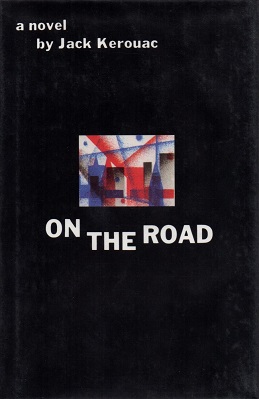
On the Road
On the Road is a 1957 novel by American writer Jack Kerouac, based on the travels of Kerouac and his friends across the United States. It is considered a defining work of the postwar Beat and Counterculture generations, with its protagonists living life against a backdrop of jazz, poetry, and drug use. The novel is a roman à clef, with many key figures of the Beat movement, such as William S. Burroughs (Old Bull Lee), Allen Ginsberg (Carlo Marx), and Neal Cassady (Dean Moriarty) represented by characters in the book, including Kerouac, himself, as the narrator, Sal Paradise.
For other uses, see On the Road (disambiguation).Author
English
United States
Print (hardback & paperback)
320 pages
The Town and the City
(1950)
The Subterraneans
(1958)
The idea for On the Road, Kerouac's second novel, was formed during the late 1940s, in a series of notebooks and then typed out, on a continuous reel of paper, during three weeks in April 1951. It was published by Viking Press in 1957.
The New York Times hailed the book's appearance as "the most beautifully executed, the clearest, and the most important utterance yet made by the generation Kerouac, himself, named years ago as 'beat,' and whose principal avatar he is."[1] In 1998, the Modern Library ranked On the Road 55th on its list of the 100 best English-language novels of the 20th century. The novel was chosen by Time magazine as one of the 100 best English-language novels from 1923 to 2005.[2]
Music in On the Road[edit]
Music is an important part of the scene that Kerouac sets in On the Road. Early in the book (Pt. 1, Ch. 3), he establishes the time period with references to the musical world: "At this time, 1947, bop was going like mad all over America. The fellows at the Loop blew, but with a tired air, because bop was somewhere between its Charlie Parker Ornithology period and another period that began with Miles Davis. And as I sat there listening to that sound of the night which bop has come to represent for all of us, I thought of all my friends from one end of the country to the other and how they were really all in the same vast backyard doing something so frantic and rushing-about."
Main characters Sal Paradise and Dean Moriarty are clearly enthusiastic fans of the jazz/bebop and early rhythm-and-blues musicians and records that were in the musical mix during the years when story took place, 1947 to 1950. Sal, Dean, and their friends are repeatedly depicted listening to specific records and going to clubs to hear their musical favorites.
For example, in one of two separate passages where they go to clubs to hear British jazz pianist George Shearing, the effect of the music is described as almost overwhelming for Dean (Pt. 2, Ch. 4): "Shearing began to play his chords; they rolled out of the piano in great rich showers, you'd think the man wouldn't have time to line them up. They rolled and rolled like the sea. Folks yelled for him to 'Go!' Dean was sweating; the sweat poured down his collar. 'There he is! That's him! Old God! Old God Shearing! Yes! Yes! Yes!' And Shearing was conscious of the madman behind him, he could hear every one of Dean's gasps and imprecations, he could sense it though he couldn't see. 'That's right!' Dean said. 'Yes!' Shearing smiled; he rocked. Shearing rose from the piano, dripping with sweat; these were his great 1949 days before he became cool and commercial. When he was gone Dean pointed to the empty piano seat. 'God's empty chair,' he said."
Kerouac mentions many other musical artists and their records throughout On the Road: Charlie Parker – "Ornithology" (Pt. 1, Ch. 3; also Pt. 3, Ch. 10); Lionel Hampton – "Central Avenue Breakdown" (Pt. 1, Ch. 13; also Pt. 4, Ch. 4); Billie Holiday – "Lover Man" (Pt.1, Ch. 13; also Pt. 3, Ch. 4); Dexter Gordon and Wardell Gray – "The Hunt" (Pt. 2, Ch. 1; Pt. 2, Ch. 4); Dizzy Gillespie – "Congo Blues" (Pt. 3, Ch. 7 – recorded under Red Norvo's name and also featuring Charlie Parker; also Pt. 3, Ch. 10; Pt. 4, Ch. 3); Willis Jackson – "Gator Tail" (Pt. 4, Ch. 1 – recorded with the Cootie Williams Orchestra); Wynonie Harris – "I Like My Baby's Pudding" (Pt. 4, Ch. 4); and Perez Prado -- "More Mambo Jambo," "Chattanooga de Mambo," "Mambo Numero Ocho" ("Mambo No. 8") (Pt. 4, Ch. 5).
Kerouac also notes several other musical artists without mentioning specific records: Miles Davis (Pt. 1, Ch. 3; Pt. 3, Ch. 10); George Shearing and his drummer Denzil Best (Pt. 2, Ch. 4; Pt. 3, Ch. 10); Slim Gaillard (Pt. 2, Ch. 11); Lester Young (Pt. 3, Ch. 10; Pt. 4, Ch. 1); Louis Armstrong (Pt. 3, Ch. 10); Roy Eldridge (Pt. 3, Ch. 10); Count Basie (Pt. 3, Ch. 10); Bennie Moten (Pt. 3, Ch. 10); Hot Lips Page (Pt. 3, Ch. 10); Thelonious Monk (Pt. 3, Ch. 10); Anita O'Day (Pt. 3, Ch. 10); Stan Getz (Pt. 4, Ch. 1); Lucky Millinder (Pt. 4, Ch. 4); and Duke Ellington (Pt. 5).
Jazz and other types of music are also featured more generally as a backdrop, with the characters often listening to music in clubs or on the radio. For example, while driving across the upper Midwest toward New York City, Sal mentions that he and Dean are listening to the radio show of well-known jazz deejay Symphony Sid Torin (Pt. 3, Ch. 11).
Kerouac also delves into the classical music genre briefly, having Sal attend a performance of Beethoven's sole opera, Fidelio (1805), in Central City, Colorado, as performed by "stars of the Metropolitan" who are visiting the area for the summer (Pt. 1, Ch. 9).